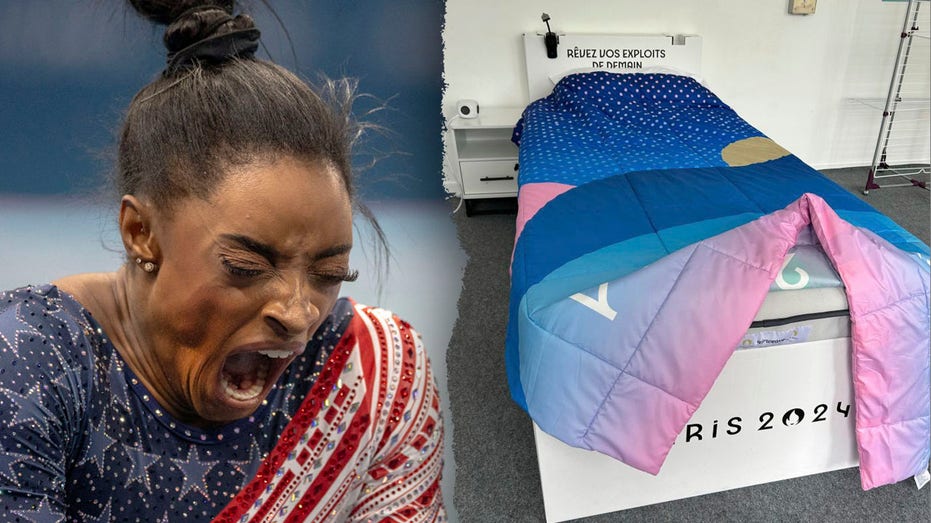Athletes at the Paris 2024 Olympics are sleeping on cardboard bed frames for the second summer games in a row.
First introduced at Tokyo 2020, the cardboard beds have made a comeback as an environmentally friendly solution in the Olympic Village, according to reports.
The athletes can extend the beds to accommodate their size and can choose the firmness of the mattress, as shown in a video posted to the Olympics YouTube page.
WITH SOME OLYMPIC EVENTS POSTPONED, SEINE RIVER WATER QUALITY POSES CONCERNS
The sustainable beds, which are 100% made in France, will be fully recycled after the games, Olympic organizers have said.
Virginia-based neurologist Dr. Chris Winter, a sleep adviser for Mattress Firm and a sleep consultant for major-league sports teams in the U.S., reacted to the sleeping arrangements in an interview with Fox News Digital.
“I was not part of the French Olympic planning, but given the overall theme of the games as being ‘more responsible, more inclusive and more equal,’ I think the cardboard bed checks those boxes,” he said.
Winter noted that past Olympic events have been associated with “tremendous amounts of waste.”
The cardboard beds are not only more economical, but also “much easier on the environment,” he said.
WANT TO GET BETTER SLEEP? EXERCISE FOR THIS LONG EACH DAY
“When the games are over, organizers are not tasked with what to do with thousands of real twin beds,” Winter said. “This creates significant cost savings, I imagine.”
Having the same beds also gives everyone a “performance advantage” when it comes to sleep, the expert noted.
“I’m sure the fact that they could more easily break if jumped on or if lots of athletes are on the bed is probably a plus, as an indirect way to control behavior,” he added.
“Plus, if an overzealous athlete throws theirs out the window, damage and risk is minimized.”
While there are benefits to the cardboard solution, Winter stressed that these structures could pose some health risks for athletes.
“For an Olympic swimmer, weightlifter or gymnast to awaken with a tweak or catch in their back could be disastrous,” he said.
SIGNED MICHAEL PHELPS ARTWORK FROM 2008 BEIJING OLYMPICS UNVEILED AND ON SALE FOR FIRST TIME
“Lilly King missed a breaststroke medal by 1/100th of a second,” Winter noted. “Could a cardboard bed be to blame? Without a doubt,” he said, expressing his opinion.
A poor night’s sleep can even affect an athlete psychologically, the expert added.
Chafen Watkins Hart, M.D., sleep specialist at National Jewish Health in Denver, Colorado, also weighed in on the importance of proper sleep for athletes.
“Getting used to a new environment, including a new bed, is daunting, especially with jet lag and the intensity of athletic competition,” she told Fox News Digital.
For more Lifestyle articles, visit www.foxnews/lifestyle
Although the mattresses reportedly have been improved from the ones used in Tokyo, they are still “very firm,” according to Hart.
“In general, it appears that the materials are washable and reusable, which is the primary reason they are being employed for thousands of athletes in the village,” she said.
For some athletes, a mattress that is too firm can cause muscle soreness, she cautioned, while others may prefer firmness.
GOING TO BED AFTER THIS TIME COULD LEAD TO POORER MENTAL HEALTH, A STANFORD STUDY FINDS
Beyond the bed and mattress, Hart also noted that temperature and roommate considerations can also adversely affect athletes’ sleep.
“The rooms do not have air conditioning, and many athletes are supplementing with their own portable units,” she said.
“Sleeping in a hot, humid environment can be really disruptive and can increase the number of arousals [during the night] … and severity of insomnia.”
Many athletes may also get a random roommate assignment with someone who has different sleep habits.
CLICK HERE TO SIGN UP FOR OUR LIFESTYLE NEWSLETTER
“Someone who is a night owl will not love bunking with an early bird,” Hart said.
“Or someone used to sleeping in a silent, dark space may have trouble adjusting to a roommate who likes to play music and keep a light on.”
For a good night’s sleep, Winter advised athletes to bring their own pillows and attempt to keep the room cool.
He also suggested bringing items that remind them of home, such as a partner’s pillowcase, favorite nighttime tea, stuffed animals, sleep masks or posters.
“Getting that Parisian apartment to feel like home can be a great advantage,” he said.
Hart agreed, adding that familiar scents, calming music and chats with loved ones can help reduce anxiety about sleeping in a strange or uncomfortable place.
Fox News Digital reached out to the International Olympic Committee for comment.
Article Source: Health From Fox News Read More




